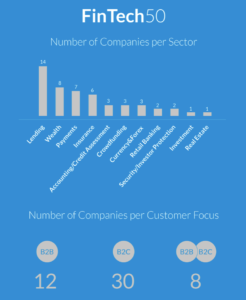What type of customers – B2C or B2B?
As a first distinction between the 50 Fintech companies, we took a look at the customer group they are focussed on. We divided them based on whether they are active in the business-to-business (B2B) or business-to-customer (B2C) market. Remarkably, only twelve of the 50 firms have a strict B2B-model while 30 have a focus on B2C business. Wondering about the other 8? Some companies combine both B2C and B2B models.
In which Fintech sectors are the 50 companies active?
Fintech, as it is known today, encompasses many different sectors of the financial industry. Within each sector, one still finds large differences of the business models and angles, that Fintechs use to revolutionize the banking sector. Nevertheless, the companies in KPMG´s ranking are sectioned into twelve groups. The largest Fintech sector represented by companies in the ranking is lending while real estate and investment account for only one Fintech business each.
Sector Overview:
Insurance: According to TechCrunch, “Insurance is the next frontier for Fintech..[It] represents a huge opportunity that has yet to see real innovation.” Six out of the 50 Fintechs in the ranking are in the Insurtech sector. All of them implement a B2C model and five out of the six were created in 2013. FinLeap´s venture Clark (Link to Venture Page) is also active in the insurtech sector.
Payments: The payments sector claims seven out of the 50 ranked Fintechs. There is an even spread between B2C- and B2B-companies in a variety of locations and on three continents amongst payment focussed businesses. This is due to the fact that, according to Bank Innovation, both B2C- and B2B-payments offer large market opportunities.
Lending: According to Statista, investment in Fintech companies focused on P2P-, online lending, and scoring reached approximately 1.82 billion US dollars in 2014. Thus, in correlation with the large investments, lending is the largest sector in KPMG’s ranking, occupying 14 out of the 50 fintechs. More than half of the lending disruptors are located in the United States. The rest are divided between Australia, China, and Germany. When it comes to customer focus, the most firms are active in the B2C-market.
Investment: Only one Fintech, located in the United States and implementing a B2C model, falls in the investment sector.
Retail Banking: Two out of the 50 Fintechs fall under the retail banking category. Both businesses were developed in the beginning of this decade and are located in Europe. According to The Financial Brand, 2016 will bring improvements in innovation, authentication, customer experience, and advisory services for the retail banking Fintechs.
Crowdfunding: Three Fintechs of KPMG´s ranking are part of the crowdfunding sector. According to Massolution, this year the crowdfunding industry is on track to account for more funding than venture capital. Quickly becoming a new trend in the Fintech industry, crowdfunding is here to stay.
Wealth: Wealth features a significant number of the 50 Fintechs. Interestingly, six out of the eight companies in the wealth sector are located in the United States while the remaining two are headquartered in London. All of the firms also are B2C focussed, finding new ways for people to manage their portfolios and optimize their returns.
Accounting/Credit Assessment: Only three startups share this sector. Two of them B2B- and one being a B2C-company. They are situated in the United States, New Zealand and China.
Security/Investor Protection: This very specific Fintech sector focusses on providing easy identity authentication and on preventing fraud in investments. Two of the 50 Fintechs fall inside this sector. Interestingly, both are situated in North America.
Currency&Forex: Three Fintechs , that have been founded fairly recently, occupy the currency and forex sector. Two of them stem from the United States while only one is located in the United Kingdom. This is surprising as, according to CityAM, London is still the number one place for forex trading with a share of nearly 41% of all global forex trading.
Real Estate: Last, but not least, one company in KPMG`s ranking of the most successful Fintech businesses in 2015 is active in real estate. Interestingly, it is the only Fintech from South America. Proptech is becoming increasingly important and it will be interesting to see, whether or not there will be more companies from this Fintech sector next year.
Generally, the Fintech industry is very diverse and dynamic. Every player in the industry has to be adaptive and innovative to keep evolving and achieve sustainable success. This blog posts provides a valuable evaluation of the status quo. However it will be most interesting to see how the different Fintech sectors develop as Fintech grows more mature.


